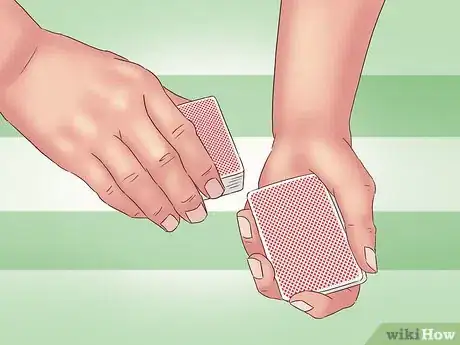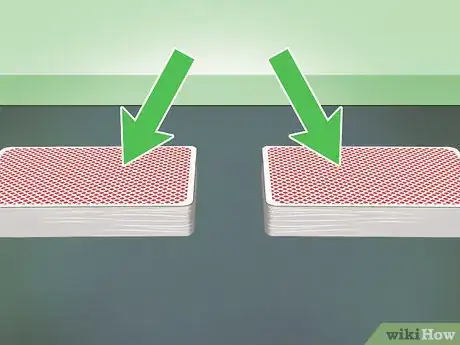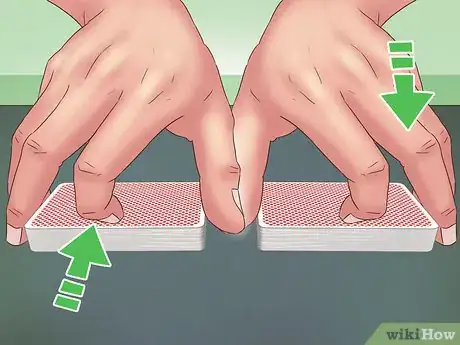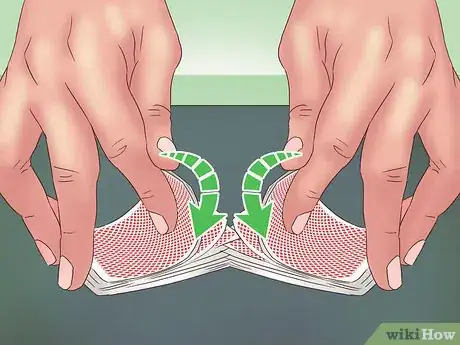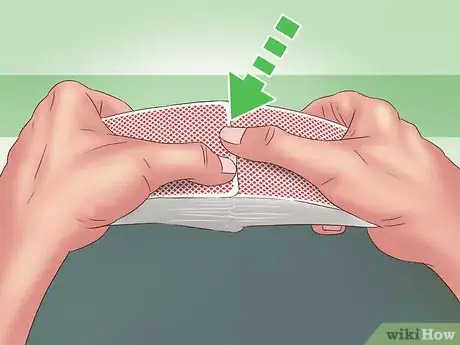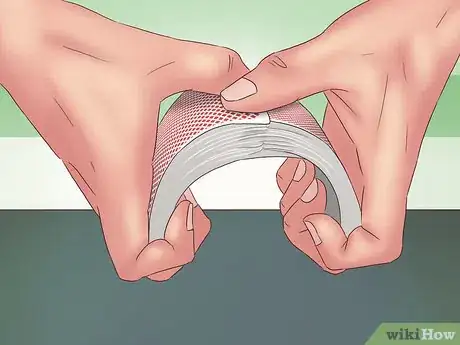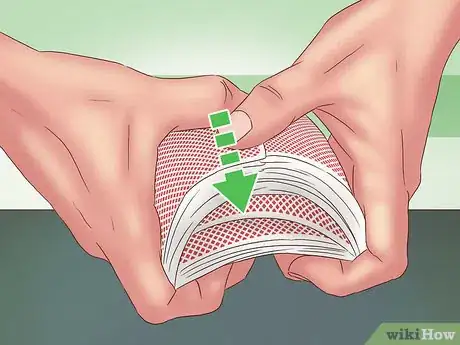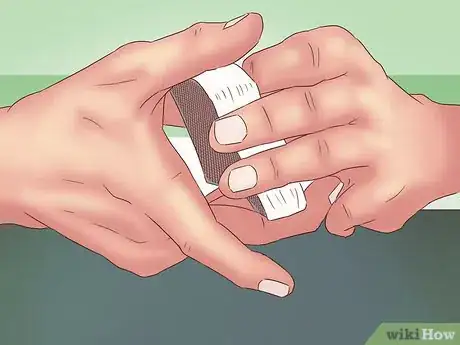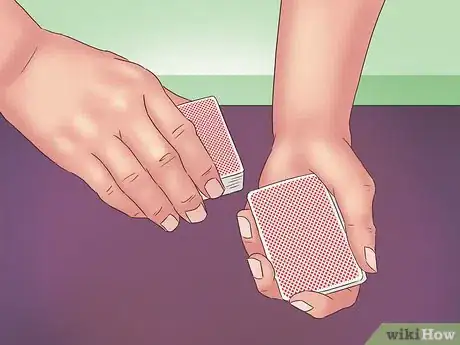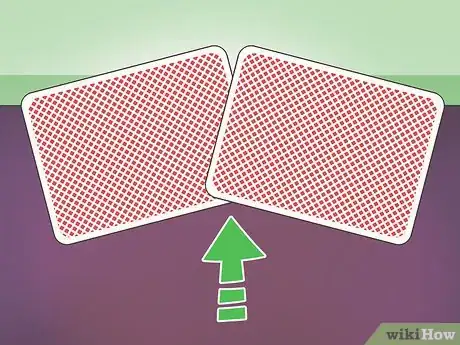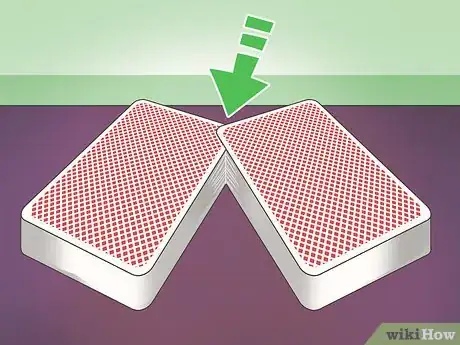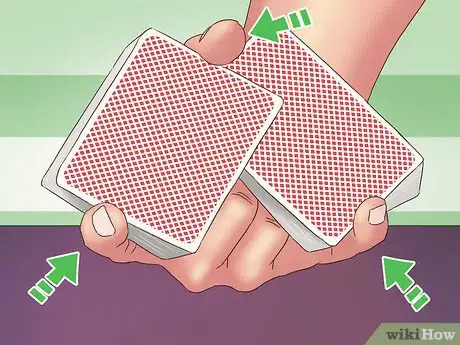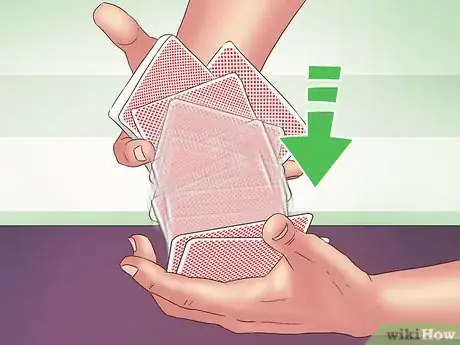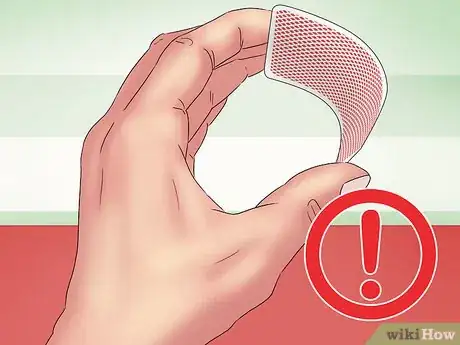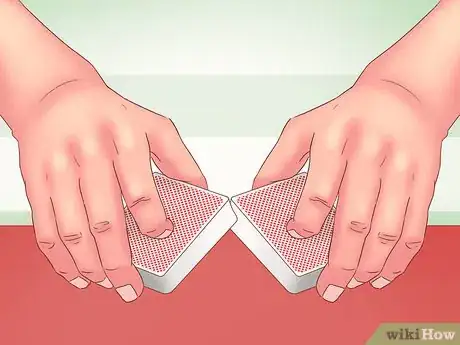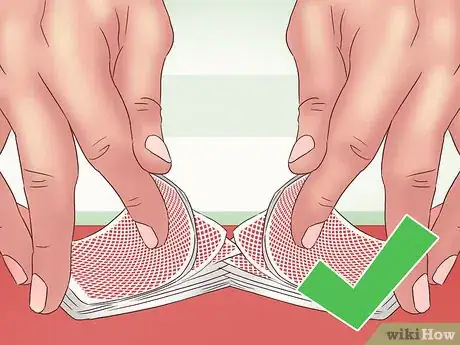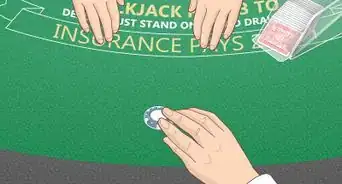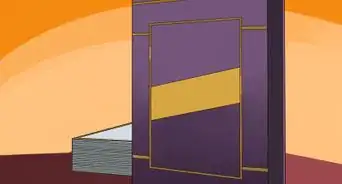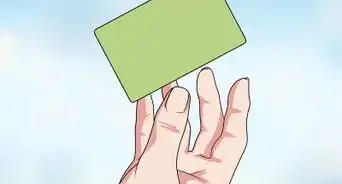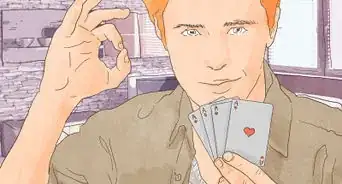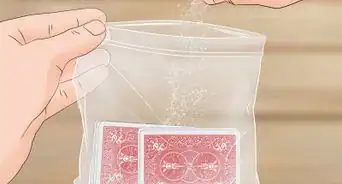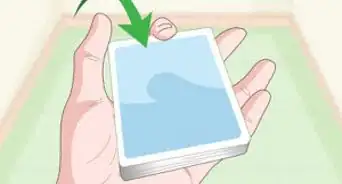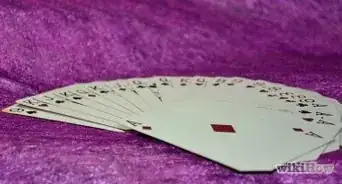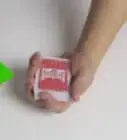X
This article was co-authored by wikiHow Staff. Our trained team of editors and researchers validate articles for accuracy and comprehensiveness. wikiHow's Content Management Team carefully monitors the work from our editorial staff to ensure that each article is backed by trusted research and meets our high quality standards.
This article has been viewed 26,419 times.
Learn more...
The cascade effect can be a great card trick to show your friends when shuffling. You can show off the standard cascade after doing a regular shuffle. You can also get a little fancy by doing the pharaoh shuffle and ending on a nice cascade. Either way, the cascade is a nice touch to add after shuffling a deck of cards.
Steps
Method 1
Method 1 of 3:
Performing the Cascade with a Standard Shuffle
-
1Cut the deck in half with your thumbs. Take the deck in your dominate hand. Place your other hand below the deck. With your dominant hand, use your thumb to rifle through the deck. Stop about halfway through. Take one half of the deck in either hand.[1]
-
2Place your stacks side by side. Set your cards on a flat surface. The two decks should be set side by side so the shorter ends of each deck face each other. The decks should be close enough that they're almost touching.Advertisement
-
3Position your fingers around the stacks. Set your thumbs on the edges of the decks that are facing each other. Curl your remaining fingers around the edges of the deck that are facing outward.[2]
- There is no precise way to secure the stacks with your fingers other than your thumb. Hold them in whatever way allows you to feel comfortable and in control.
-
4Release the cards slowly with your thumbs. Pull your thumbs upward to create a slight arch in each deck. Then, gently tip each thumb backwards. This will cause the cards to fall inward, overlapping with one another. The cards are now shuffled.[3]
- When you're done, the decks should be lying on your flat surface. The tips of the cards on each deck should overlap with one another.
-
5Place your thumbs on top of the deck. Place both your thumbs at the point where the cards overlap. Place your thumbs down firmly, as this helps secure the deck and then complete the cascade.[4]
-
6Make an arch with the cards. Secure the edges of each deck by curling your middle, ring, and index finger around the edges. Lift the cards off the flat surface. Bend your hands downward slightly to create a mild arch with the cards.[5]
- When you're done, your cards should form an arch. They should be connected at the center of the arch by the overlapping tips of each deck.
-
7Release the arch to cascade. All you need to do now is uncurl your thumbs. The cards should naturally cascade together.[6]
- The cascade may not go smoothly the first time as it takes awhile to get a hang of the movements required. If your cards don't cascade, start over and try again.
-
8Push the stacks back together. After cascading your cards, push the deck back together. Straighten your cards into a neat pile. If you want, you can repeat the process a few times to fully shuffle the deck.
Advertisement
Method 2
Method 2 of 3:
Doing a Cascade with a Pharaoh Shuffle
-
1Create two stacks with your thumb. Hold the deck in your dominant hand and place your other hand below the deck. Use your thumb to rifle through cards until you reach the rough halfway point. Then, take one half of the cards in either hand. This creates two small decks.[7]
-
2Overlap the cards together at the corners. Press the tips of corners of either deck together. Then, slide the cards in both decks together gently so the cards in either deck overlap slightly. This begins your shuffle.[8]
- Some slight wiggling motion may be required to get the decks to overlap.
-
3Position the stacks in an upside down v-shape. Now that the decks are connected at either corner, bend the top deck downward. Bend slowly enough that the overlapping cards don't come undone. Keeping bending the top deck until you make the rough shape of an upside down "v" with your decks.[9]
- From your perspective, however, the shape will simply look like a "v." Those watching you will see an upside down "v."
-
4Hold the stacks with your thumb, index finger, and pinky finger. Transfer the cards to your dominate hand. Place your thumb at the point where the cards meet at the corners. Curl your index finger around the bottom of one deck. Curl your pinky finger around the bottom of the other.[10]
- It may take some maneuvering to hold the decks properly. A lot depends on hand size, so you may find you need to make your v bigger or smaller to hold your deck securely.
-
5Release the cards to cascade. Hold your non-dominant hand below the deck of cards. Let go of the deck with your thumb. The cards will then cascade into your non-dominant hand.[11]
Advertisement
Method 3
Method 3 of 3:
Avoiding Common Mistakes
-
1Be gentle with your cards. It's easy to damage cards by not handling them with care. When arching the deck especially, you risk permanently bending the cards if you handle them too roughly. Make sure to be very gentle with the cards. Always stop bending when you feel resistance.[12]
-
2Go slowly at first. Pro card dealers are able to quickly and impressively shuffle and cascade a deck. However, getting these motions down takes time. If you jump into fast motions, it's easy to make mistakes when shuffling. At first, do all the motions slowly and precisely. With time, you'll get the hang of shuffling your deck and you should be able to complete the cascade faster.
-
3Have patience. It takes awhile to figure out what's comfortable for you in terms of shuffling your deck. Don't get discouraged if you fumble a bit at first. Give it time and practice each day. Eventually, you'll be cascading cards with ease.
Advertisement
References
- ↑ http://www.artofmanliness.com/2012/07/09/how-shuffle-a-deck-of-cards-an-illustrated-guide/
- ↑ http://www.artofmanliness.com/2012/07/09/how-shuffle-a-deck-of-cards-an-illustrated-guide/
- ↑ http://www.artofmanliness.com/2012/07/09/how-shuffle-a-deck-of-cards-an-illustrated-guide/
- ↑ http://www.artofmanliness.com/2012/07/09/how-shuffle-a-deck-of-cards-an-illustrated-guide/
- ↑ http://www.artofmanliness.com/2012/07/09/how-shuffle-a-deck-of-cards-an-illustrated-guide/
- ↑ http://www.artofmanliness.com/2012/07/09/how-shuffle-a-deck-of-cards-an-illustrated-guide/
- ↑ http://www.artofmanliness.com/2012/07/09/how-shuffle-a-deck-of-cards-an-illustrated-guide/
- ↑ https://www.youtube.com/watch?v=yjyXVRIjv1E
- ↑ https://www.youtube.com/watch?v=yjyXVRIjv1E
About This Article
Advertisement
